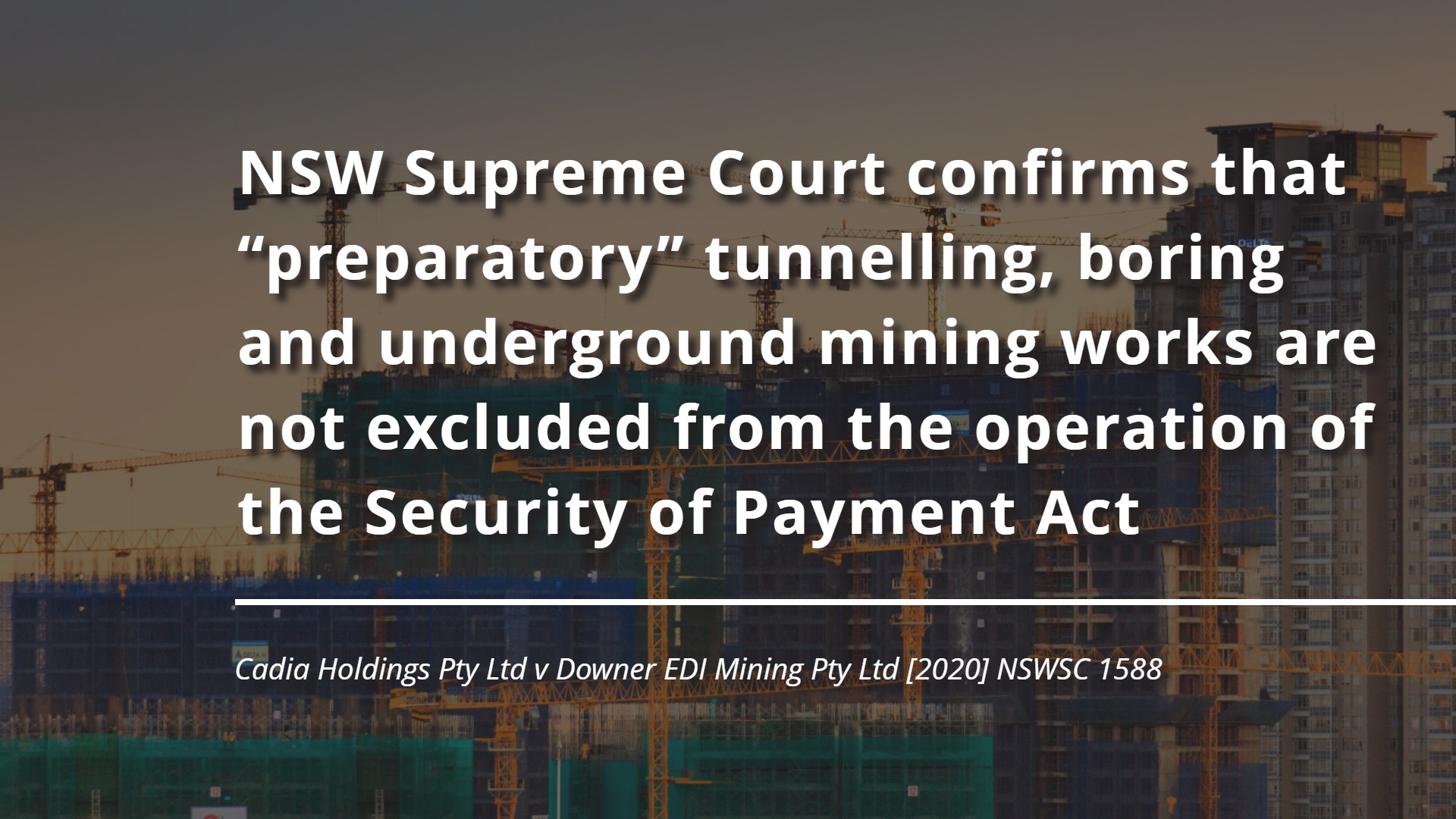In a recent decision, the Supreme Court of NSW confirmed that disputes over progress payments for preparatory tunnelling, boring and underground works on mining sites may be adjudicated under the Security of Payment regime. In what stands to be the first NSW decision of its kind, the Court has provided its guidance to the interpretation of the (colloquial) “Mining Exception” under the Building and Construction Industry Security of Payment Act 1999 (NSW) (SOP Act).
Background
Cadia Holdings Pty Ltd (Cadia) and Downer EDI Mining Pty Ltd (Downer) entered into a contract described as being “For the Provision of Lateral Development Works” (Contract) at the Cadia East underground cave mine. The scope of work, most of which was underground work, involved “tunnelling or boring” as well as “constructing underground works” so as to construct an access to the proposed undercut and extraction levels of the mine. The works also included, amongst other things, the “haulage of excavated material to the nominated dumping point”.
In the course of the works, a payment dispute arose between the parties. Downer applied for adjudication under the SOP Act with the adjudicator subsequently determining that approximately $1 million was payable to Downer. Cadia sought to challenge that determination on the primary bases that work carried out under the Contract did not fall within the definition of “construction work” under the SOP Act and was expressly excluded under the “Mining Exception” in s 5(2)(b) of the SOP Act.
NSW SOP Act
Section 5(2) of the SOP Act provides that “construction work does not include…the extraction (whether by underground or surface working) of minerals, including tunnelling or boring, or constructing underground works, for that purpose”. Each of the east coast security of payment regimes (Queensland, New South Wales Victoria, South Australia, Tasmania and the Australian Capital Territory) contain a similar exemption.
Decision
The NSW Supreme Court held that the Mining Exception was to be construed beneficially to the claimant (i.e. Downer); that is, it was to be “construed narrowly”. The Court found that the object and purpose of the Contract was not to cause Downer to undertake work for the “purpose” of extracting minerals, but was rather work preparatory to, and in anticipation of the ultimate and later extraction of minerals. Stevenson J concluded that:
“the Mining Exception does not specify tunnelling, boring or construction of underground works “preparatory to” extraction of minerals. Rather the Mining Exception simply specifies such works “for” the purpose of extraction of minerals. That suggests to me a legislative intention that tunnelling, boring or construction of underground works referred to in the Mining Exception must be for the actual purpose of extracting minerals.”
As such, where the object and purpose of a contract is not to cause the contractor to undertake work “for the purpose of actually extracting minerals”, the Mining Exception will not apply. This decision is in line with two earlier Queensland decisions where the Court found that preliminary site preparation work on a mining site (clearing, grubbing etc) was not excluded under the Queensland equivalent security of payment legislation.
Key Takeaway
The NSW Supreme Court’s recent decision confirms that preparatory tunnelling, boring and underground works on a mining site is not exempt from the operation of the SOP Act.
This decision is a timely reminder that the SOP Act is a wide-reaching effective tool to recover disputed progress payments, which may also be used by contractors and subcontractors carrying out preparatory tunnelling, boring and underground works on mining sites.
This publication does not deal with every important topic or change in law and is not intended to be relied upon as a substitute for legal or other advice that may be relevant to the reader’s specific circumstances. If you have found this publication of interest and would like to know more or wish to obtain legal advice relevant to your circumstances please contact one of the named individuals listed.




